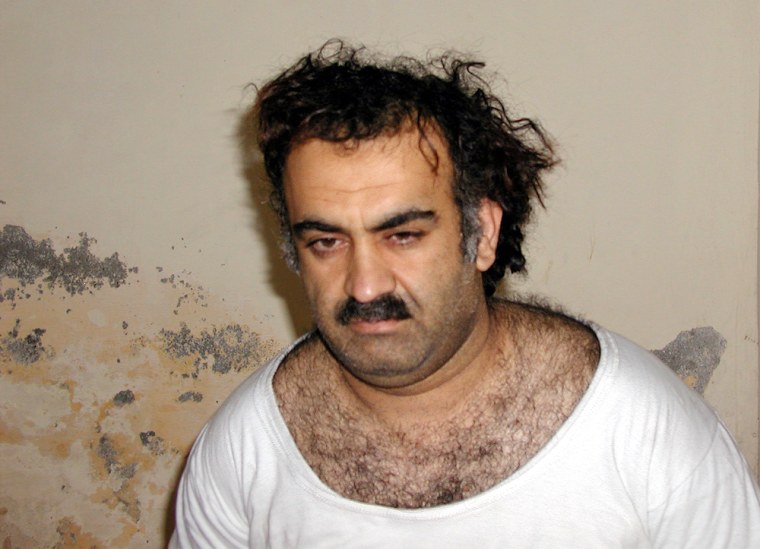The Central Intelligence Agency has used a secret set of rules for the interrogation of high-level al-Qaida detainees that has fueled concerns within the agency about the abuse of prisoners, the New York Times reported Thursday, citing current and former counterterrorism officials.
Although none of the chief leaders and operatives is known to be housed in Iraq, the rules first adopted by the Bush administration following the Sept. 11, 2001, attacks may have established a new understanding that officials are permitted increased freedoms in dealing harshly with prisoners, the paper said.
The interrogation tactics are intended to simulate torture, but officials told the New York Times that they are supposed to stop short of serious injury. Such authorized measures include hooding, roughing up, soaking with water, and depriving prisoners of food, light, and medications.
In one case, an alleged planner of the Sept. 11 attacks, Khalid Shaikh Mohammed, was strapped down, pushed under water and made to believe he would drown — a technique known as "water boarding," the paper said.
Counterterrorism officials reportedly said that the methods used by the CIA are so harsh that the Federal Bureau of Investigation has warned its agents not to participate in the interrogations of high-level detainees — the techniques employed by the CIA would be prohibited in criminal cases and could compromise FBI agents in future cases.
The agency has so far not allowed any independent observer or human rights group access to top al-Qaida prisoners.
New Iraq abuse images 'appalling'
The report comes in the heels of the growing scandal over the abuse of Iraqi inmates in the Abu Ghraib prison in Baghdad.
On Thursday, Defense Secretary Donald Rumsfeld — who has borne the brunt of criticism over the abuses — visited the prison during a surprise trip to Iraq.
On Wednesday, members of Congress said that new photographs and video clips of U.S. soldiers brutalizing Iraqi prisoners were even worse than they had expected, depicting “disgusting” and “appalling” instances of torture and humiliation.
“I expected that these pictures would be very hard on the stomach lining, and it was significantly worse than anything that I had anticipated,” said Sen. Ron Wyden, D-Ore., one of several members of Congress who emerged grim-faced from lawmakers-only screenings in the Capitol building. “Take the worst case and multiply it several times over.”
“I don’t know how the hell these people got into our Army,” said Ben Nighthorse Campbell, R-Colo.
Senate Majority Leader Bill Frist, R-Tenn., called the images “appalling,” saying they “go beyond” what much of the world has already seen in photos broadcast and published earlier this month.
But House Majority Leader Tom DeLay, R-Texas, while acknowledging that the materials showed “pretty disgusting sexual acts,” said there was no need for more investigations. “The American system is working,” he said. “... Our enemies are incredibly more evil than what is depicted in the pictures.”
Lawmakers had demanded to see the images. Defense officials carried three discs with them to the Capitol, containing about 1,800 still images and an undisclosed number of video clips of U.S. soldiers brutalizing Iraqi captives at Abu Ghraib.
Several lawmakers said photos of sexual intercourse were among the images defense officials screened for lawmakers in a top-secret room in the Capitol. At least some of them appeared to depict consensual sex involving U.S. military personnel, they added.
Others showed military dogs snarling at cowering prisoners, as well as shots of Iraqi women commanded to expose their breasts, some said. Others said there were images of hooded Iraqi prisoners being forced to masturbate while cameras captured the scene.
Rep. Jane Harman, D-Calif., said she saw a clothed man hurling himself against a wall as though trying to knock himself unconscious.
“The whole thing is disgusting, and it’s hard to believe that this actually is taking place in a military facility,” said Sen. Dianne Feinstein, D-Calif.
Rumsfeld defends most techniques
Rumsfeld has said the abuses at Abu Ghraib were unauthorized actions taken by a handful of personnel, but senators sharply questioned those statements after viewing the new pictures.
“In one particular still photo among troops that are in a hallway, where you’ve seen the clump of people tied together on the floor, we counted seven or eight troops," said Sen. Bill Nelson, D-Fla. “Now, you can’t tell me all of this is going with seven or eight Army privates.”
“The question is how far up the chain of the command did the orders come from, and where did that failure of the command and control occur?” Nelson added.
But Rumsfeld defended U.S. military interrogation techniques in general Wednesday, rejecting complaints that they violated international rules and could endanger U.S. captives.
In other developments:
- The U.S. military announced Wednesday that it had launched an investigation into a complaint of detainee abuse in Afghanistan. Former Afghan police Col. Sayed Nabi Siddiqui told The New York Times that he was subjected to beating, kicking, sleep deprivation, taunts and sexual abuse during about 40 days in U.S. custody last year.
- Pfc. Lynndie England, an Army soldier facing court-martial in connection with being photographed with naked Iraqi prisoners, said in an interview that she was following orders from unidentified superiors to create psychological pressure on the prisoners.
- The Associated Press reported Tuesday that it had obtained a letter in which Lt. Col. Jerry L. Phillabaum, the commander of the 320th MP Battalion alleged that a female soldier took “” on Iraqi prisoners at another camp who she believed had raped Army Pfc. Jessica Lynch. The AP said the letter, whose charges the soldier denied, was written to rebut charges against his leadership of the battalion.
